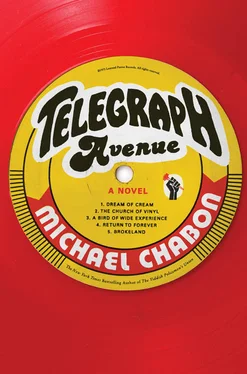He was drawing an invisible mandala across the glossy tile with his high-top Chuck Taylors, head down, hands in the back pockets of the jeans she liked best on him, humming the soundtrack to his impatience. When he saw her, the panic in his face gave way so suddenly to relief that she thought he would cry.
“What’s wrong?” she said.
“Gwen’s in labor.”
“Is Archy there?”
“No. She’s not home, Aviva. She’s here.”
“Oh, no.”
“Yeah. Her water broke, there was meconium?”
“A lot?”
“Not a lot, but some. The doc said we probably don’t need to worry yet, but they wanted her admitted and on the monitor. In case there’s some fetal distress.”
“Who’s the attending?”
“Your boy.”
“Lazar?”
“Quite the charmer.”
“Shit! Were you with her when her water broke?”
“Yes.”
“Why didn’t you call me?”
A blankness drifted across his face like ink from a squid, alerting her that the next words to issue from his lips were going to maintain a fraught if not adversarial relation to the truth. “I lost my phone,” he said.
“Lost it where?”
He shrugged. “In the car.”
She decided, whatever the lie, to let it go for now. “How is Gwen?” she said.
Since leaving the house to meet Rain and Audrey at the hospital, Aviva had been aware, a ground underlying the figure of every calm suggestion she made to Rain, every forbearing interaction she had with the staff, that the whole of her emotional capacity—carefully concealed from everyone around like the blacked-out windows of some wartime aircraft factory—had been shifted over to the production of anger; she was furious with Gwen.
No, it was something deeper and more selfish, more craven than fury, which had to Aviva’s ear a notion of scourging, of refining fire. Aviva was hurt. And her anger was the especial, bitter anger of the indicted. Gwen was breaking their partnership, renouncing their shared calling, for reasons that Aviva could not dismiss without doing violence to certain inconvenient and embarrassing facts about the nature and demographics of their practice, about the paradoxical taint of the boutique that hung over modern midwifery, a profession that had at one time, not long ago, confined its ministrations to poor and to rural women. Aviva was annoyed—though this annoyance was also not uncontaminated by consciousness of those fucking facts —by the deft and ruthless mau-mauing to which Gwen had, with perfect justification, subjected the hapless review panel. And that in spite—or because—of Gwen having saved their asses by so doing.
“She is not happy,” Nat said. “She doesn’t know where Archy is, that’s one. Two, no way is she ever letting that fuckhead Lazar lay one hand on her, quote unquote. Three, get your ass down there, please, as fast as you can. She needs you, Aviva. She says she’s not going to have the baby without you there to catch it.”
“How sweet.”
“I’m just the messenger. And I better get back to her. I don’t think Julie is a whole lot of support.”
“Julie?”
“He’s with us. He’s kind of—”
“How did that happen?”
Again a mild facial paralysis, a narrative dystonia slackened his features. “I picked him up,” he said. “Uh, on the way.”
“What the fuck is going on, Nat? No, forget it. I’ll kill you later.”
“Okay.”
“Okay?”
“Later works for me.”
“Good. Now. Tell Gwen—”
“Aviva?”
It was Audrey, standing in the corridor making a tentative little handwringing gesture, her head inclined toward the door of Rain’s LDR. “She says she wants to push.”
“Ho-kay,” Aviva said. She gave Nat a push of her own, fingers to his sternum, rocking him back a step or two. “Tell her I’ll be there as fast as I can. You help her get settled, see her into a room, all right? Make yourself useful. Play the dad. Think you can do that?”
“I think I can fake it,” Nat said.
“Meantime, where the fuck is Archy?”
“I’ve been trying him, he doesn’t answer.”
“Try sending one of those text-message things.”
“What is that, I don’t know what that is.”
“I don’t, either. Ask Julie.”
“Aviva?” Audrey said, venturing closer in her tone toward accusatory.
“I have to get back to Rain,” Aviva said. “Go. Tell Gwen I’ll be there soon.”
“What if you get hung up, though?” Nat said. “They send in Lazar, I think she’s going to fucking bite his head off.”
“It’s a hospital,” Aviva said. “They can sew it back on.”
“Ithink I would have to say, ‘Mirror, Mirror’,” Julie said.
“The beard,” Gwen agreed vaguely as another contraction gathered out there in the gulf of pain on whose shore she was planted like a low-lying town, levees buckling under the advancing wave. She had put Julie’s hand against her stomach during the last one, let him feel the skin turn from upholstery to plate. “Spock with a beard.”
“The beard is, like, even more stylish nowadays than it was back then,” Julie said. “Goatees are in.”
She had instructed him to distract her, though he suspected that she didn’t mean it, that she was not capable of being distracted from her purpose today. The contractions took up all of Gwen’s attention. Each one became, as it arose, the object of intense study. But Julie was trying his best, even though, for his part, he was feeling, if anything, too distracted. Knowing he ought to be there, totally there, for Gwen, at least until his father got back or, better, until his mother showed up. But he couldn’t stop thinking about Titus, wondering where he was, where he might choose to run, if he was ever coming back. The elusive Titus, a cat burglar rappelling down the sheer wall of Julie’s life. Fugitive as a passing aspiration, one of those daydreams that you knew, even as you daydreamed it, would take more money, more luck, more coolness than you could ever hope to have.
“Keep talking Trek ,” Gwen instructed him softly, holding herself still, her eyes closed, possibly keeping some kind of internal count, even though Julie, with his watch, was faithfully tracking the contractions’ frequency and duration on the back of an envelope he had found in her car. “It’s helping. Also I think it was more of a Van Dyck.”
“Okay,” Julie said, unsticking his legs from the vinyl seat of the LDR’s armchair. He turned around to face Gwen, holding her moist left hand in his right one. Gwen was lying on the bed in Archy’s old Xavier McDaniel T-shirt and a clean pair of leggings she had sent Julie into her house to retrieve on the way here. She had allowed herself to be hooked to the fetal monitor, but she refused to change into a gown as a way of proving her determination not to have this baby until Aviva was free and there was no need for the nurses to page Paul Lazar. “Also, the Captain’s Woman, on that one?”
“Oh, you like that.” The soft voice, studious, a librarian of pain running her finger down some endless index of burning. “Do you.”
“She’s, I don’t know. I guess she’s pretty kick-ass.”
Not saying that whenever he watched that episode, which he first remembered seeing with Gwen the night his parents went out to see Almost Famous , he liked to imagine that he was the Captain’s Woman, stalking the quarters of the evil Kirk with her bare midriff and her Tantalus Field, waiting for the captain to return to her arms, her lips, to the retro-future 1960s starship bed with the red sparkle-mesh bedsheets.
Forty-nine seconds went by in silence, and then she opened her eyes again. Julie wrote down the time and duration on the back of the envelope, which had been sent to Gwen by the law firm of Leopold, Valsalva & Rubin and which Gwen had not bothered to open. It bore a serious and, Julie would have thought, urgent aspect.
Читать дальше
Конец ознакомительного отрывка
Купить книгу












